Get Quick and Secure Access to Bard AI: Step by Step Guide to Login Google Bard
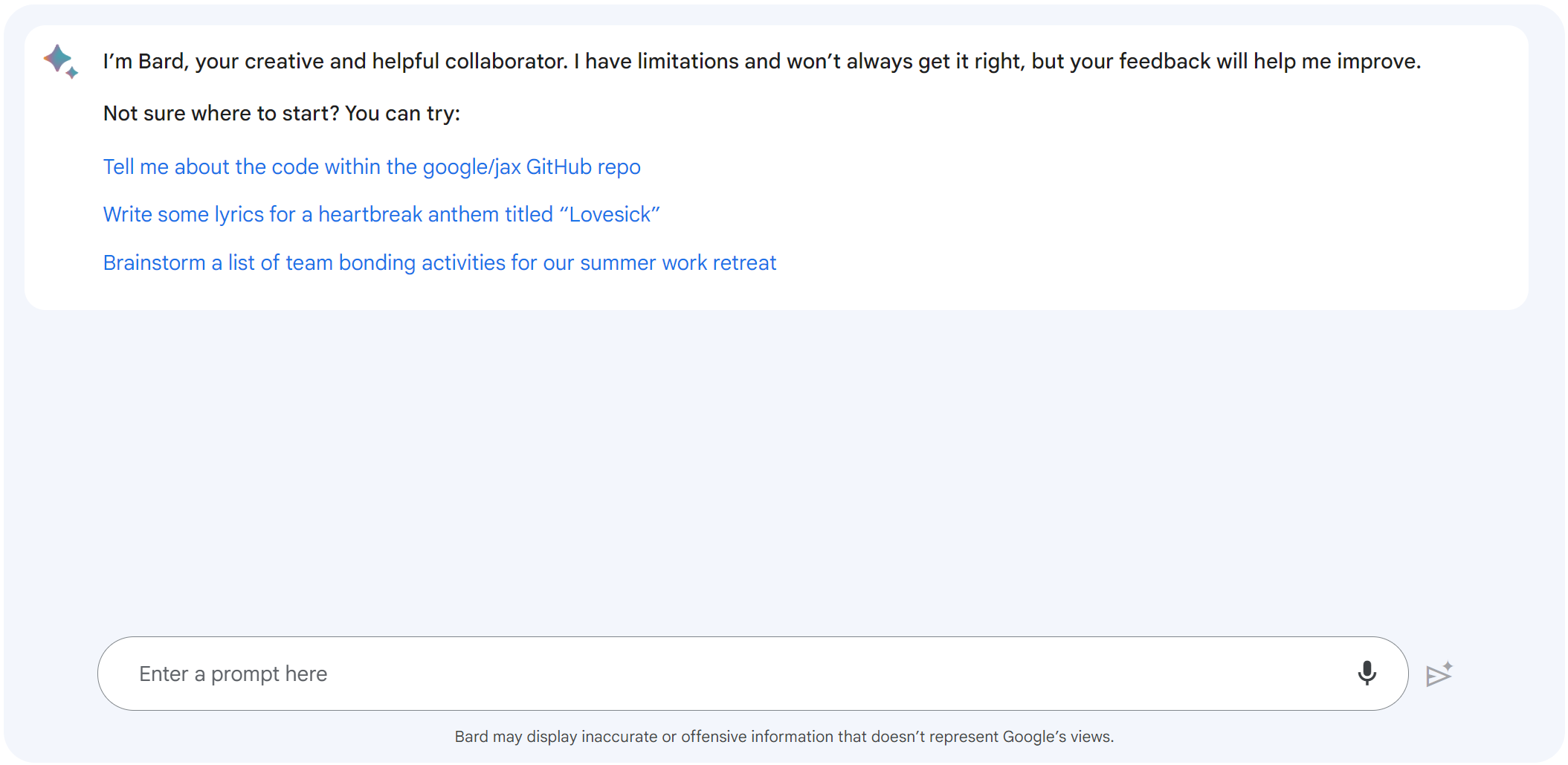
Looking to use Bard AI?
Step 1: Go to Login Google Bard Website in your preferred web browser
Get ready to tap into the impressive features of Bard AI, now more accessible than ever before. With the waitlist finally over, you can login quick and secure to Google Bard, irrespective of your device or browser type.
Here’s your step-by-step guide:
- Start by launching your favorite web browser on your chosen device – it could be a computer, laptop, smartphone, or tablet. Google Bard login is supported across a wide range of popular web browsers such as Chrome, Safari, Edge, Firefox, and many more.
- Next, type the following URL into your web browser’s address bar: https://bard.google.com. This is your direct portal to access Google Bard login and unlock the full potential of Bard AI.
- Press the Enter key or click on the Go button to navigate to the Bard AI homepage. By this point, you’re just a few clicks away from using the cutting-edge features of Bard AI.
- Experience the sheer convenience and power of Google Bard login today! Remember, the world of Bard AI is available to you, right at your fingertips, regardless of the device or platform you’re using.
It’s important to note that Google Bard AI is a separate entity from Google’s search engine. To access Bard AI, use the dedicated URL provided. This ensures you directly access the chatbot without any confusion.
Step 2: Sign in with your Google account
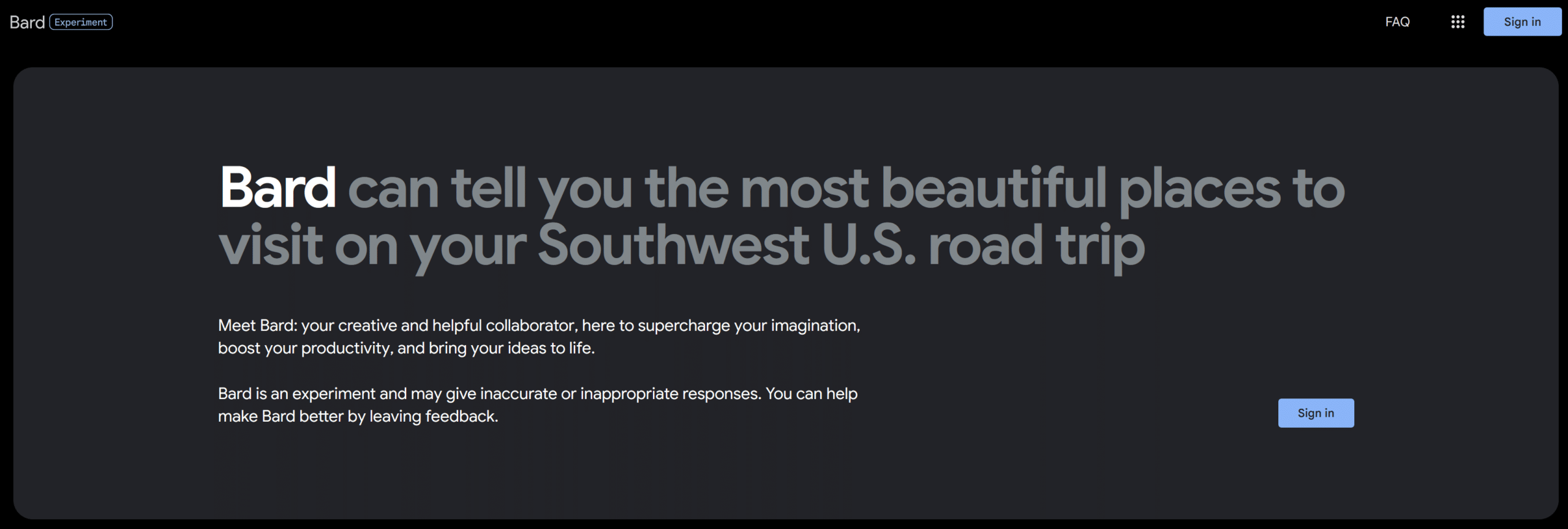
- If you’re not already signed in, locate the “Sign In” option at the bottom-right corner of the page.
- Click on “Sign In” to log in to your Google account and gain access to Bard AI.
- If you encounter an error message stating “Bard isn’t supported for this account,” it may be due to being under 18 years old or your Google Workspace or Family Link administrator not granting access to Bard.
- Similarly, if you see the message “Something went wrong,” it could indicate that you are in an unsupported location or using the wrong type of Google account.
Step 3: Click on "Try Bard."

- Look for the “Try Bard” button at the bottom-right corner of the page.
- By clicking on this button, you initiate your interaction with Bard AI.
Additionally, you will notice the Google Bard Terms & Privacy document expanding for your review.
Step 4: Scroll down and click on "I agree."
- Take your time to review the terms fully to understand how Google utilizes your data.
- Once you’ve read through the document, scroll to the bottom and click on “I agree” to proceed.
Step 5: Read the welcome message and click on "Continue."
- After accepting the terms, you’ll be greeted with a welcome message from Bard AI.
- Take a moment to read through the message, which includes important information about Bard being an experiment.
- Note that Bard may occasionally provide inaccurate or unconventional responses as part of its experimental nature.
- Click on “Continue” to initiate your conversations, ask questions, and generate content using Bard AI.
Problems to Login Google Bart?
If you’re encountering issues with Google Bart, reaching out to the official support page can provide you with the best assistance. In this article, we’ll guide you on how to access Google Bart support and provide additional general tips to help resolve common problems. By following these steps, you can ensure a smoother experience with Google Bart.
To access Google Bart support, follow these steps:
- Visit the official Google Bart support page.
- Look for the “Contact Us” or “Support” section on the page.
- Click on the provided link or button to access the support options.
- Choose the appropriate support channel, such as live chat, email, or phone support.
- Provide relevant details about your issue and follow the instructions provided by the support team.
Google Bard Login: Availability of Bard AI
Bard AI, a remarkable chatbot developed by Google, is currently accessible in over 180 countries and territories worldwide. It supports three languages and continues to expand its reach while complying with local regulations and adhering to Google’s AI principles.
Bard can be used in the following languages:
- US English
- Japanese
- Korean
Users can access Bard AI in the following countries and territories:
- Algeria
- American Samoa
- Angola
- Anguilla
- Antigua and Barbuda
- Argentina
- Armenia
- Aruba
- Australia
- Azerbaijan
- Bahrain
- Bangladesh
- Barbados
- Belize
- Benin
- Bermuda
- Bhutan
- Bolivia
- Botswana
- British Indian Ocean Territory
- British Virgin Islands
- Brunei
- Burkina Faso
- Burundi
- Cabo Verde
- Cambodia
- Cameroon
- Caribbean Netherlands
- Cayman Islands
- Central African Republic
- Chad
- Chile
- Christmas Island
- Cocos (Keeling) Islands
- Colombia
- Comoros
- Cook Islands
- Costa Rica
- Côte d’Ivoire
- Curaçao
- Democratic Republic of the Congo
- Djibouti
- Dominica
- Dominican Republic
- Ecuador
- Egypt
- El Salvador
- Equatorial Guinea
- Eritrea
- Eswatini
- Ethiopia
- Falkland Islands (Islas Malvinas)
- Fiji
- Gabon
- Georgia
- Ghana
- Gibraltar
- Grenada
- Guam
- Guatemala
- Guernsey
- Guinea
- Guinea-Bissau
- Guyana
- Haiti
- Heard Island and McDonald Islands
- Honduras
- India
- Indonesia
- Iraq
- Isle of Man
- Israel
- Jamaica
- Japan
- Jersey
- Jordan
- Kazakhstan
- Kenya
- Kiribati
- Kuwait
- Kyrgyzstan
- Laos
- Lebanon
- Lesotho
- Liberia
- Libya
- Madagascar
- Malawi
- Malaysia
- Maldives
- Mali
- Marshall Islands
- Mauritania
- Mauritius
- Mexico
- Micronesia
- Mongolia
- Montserrat
- Morocco
- Mozambique
- Namibia
- Nauru
- Nepal
- New Caledonia
- New Zealand
- Nicaragua
- Niger
- Nigeria
- Niue
- Norfolk Island
- Northern Mariana Islands
- Oman
- Pakistan
- Palau
- Palestine
- Panama
- Papua New Guinea
- Paraguay
- Peru
- Philippines
- Pitcairn Islands
- Puerto Rico
- Qatar
- Republic of the Congo
- Rwanda
- Saint Barthélemy
- Saint Helena
- Saint Kitts and Nevis
- Saint Lucia
- Saint Pierre and Miquelon
- Saint Vincent and the Grenadines
- Samoa
- São Tomé and Príncipe
- Saudi Arabia
- Senegal
- Seychelles
- Sierra Leone
- Singapore
- Solomon Islands
- Somalia
- South Africa
- South Georgia
- South Korea
- South Sudan
- Sri Lanka
- Sudan
- Suriname
- Taiwan
- Tajikistan
- Tanzania
- Thailand
- The Bahamas
- The Gambia
- Timor-Leste
- Togo
- Tokelau
- Tonga
- Trinidad and Tobago
- Tunisia
- Türkiye
- Turkmenistan
- Turks and Caicos Islands
- Tuvalu
- U.S. Virgin Islands
- Uganda
- United Arab Emirates
- United Kingdom
- United States
- United States Minor Outlying Islands
- Uruguay
- Uzbekistan
- Vanuatu
- Venezuela
- Vietnam
- Wallis and Futuna
- Western Sahara
- Yemen
- Zambia
- Zimbabwe
- Algeria
- American Samoa
- Angola
- Anguilla
- Antigua and Barbuda
- Argentina
- Armenia
- Aruba
- Austria
- Australia
- Azerbaijan
- Bahrain
- Bangladesh
- Barbados
- Belize
- Benin
- Bermuda
- Bhutan
- Bolivia
- Botswana
- British Indian Ocean Territory
- British Virgin Islands
- Brunei
- Burkina Faso
- Burundi
- Cabo Verde
- Cambodia
- Cameroon
- Caribbean Netherlands
- Cayman Islands
- Central African Republic
- Chad
- Chile
- Christmas Island
- Cocos (Keeling) Islands
- Colombia
- Comoros
- Cook Islands
- Costa Rica
- Côte d’Ivoire
- Curaçao
- Democratic Republic of the Congo
- Djibouti
- Dominica
- Dominican Republic
- Ecuador
- Egypt
- El Salvador
- Equatorial Guinea
- Eritrea
- Eswatini
- Ethiopia
- Europe
- Falkland Islands (Islas Malvinas)
- Fiji
- Gabon
- Georgia
- Germany
- Ghana
- Gibraltar
- Grenada
- Guam
- Guatemala
- Guernsey
- Guinea
- Guinea-Bissau
- Guyana
- Haiti
- Heard Island and McDonald Islands
- Honduras
- India
- Indonesia
- Iraq
- Isle of Man
- Israel
- Jamaica
- Japan
- Jersey
- Jordan
- Kazakhstan
- Kenya
- Kiribati
- Kuwait
- Kyrgyzstan
- Laos
- Lebanon
- Lesotho
- Liberia
- Libya
- Madagascar
- Malawi
- Malaysia
- Maldives
- Mali
- Marshall Islands
- Mauritania
- Mauritius
- Mexico
- Micronesia
- Mongolia
- Montserrat
- Morocco
- Mozambique
- Namibia
- Nauru
- Nepal
- New Caledonia
- New Zealand
- Nicaragua
- Niger
- Nigeria
- Niue
- Norfolk Island
- Northern Mariana Islands
- Oman
- Pakistan
- Palau
- Palestine
- Panama
- Papua New Guinea
- Paraguay
- Peru
- Philippines
- Pitcairn Islands
- Puerto Rico
- Qatar
- Republic of the Congo
- Rwanda
- Saint Barthélemy
- Saint Helena
- Saint Kitts and Nevis
- Saint Lucia
- Saint Pierre and Miquelon
- Saint Vincent and the Grenadines
- Samoa
- São Tomé and Príncipe
- Saudi Arabia
- Senegal
- Seychelles
- Sierra Leone
- Singapore
- Solomon Islands
- Somalia
- South Africa
- South Georgia
- South Korea
- South Sudan
- Sri Lanka
- Sudan
- Suriname
- Taiwan
- Tajikistan
- Tanzania
- Thailand
- The Bahamas
- The Gambia
- Timor-Leste
- Togo
- Tokelau
- Tonga
- Trinidad and Tobago
- Tunisia
- Türkiye
- Turkmenistan
- Turks and Caicos Islands
- Tuvalu
- U.S. Virgin Islands
- Uganda
- United Arab Emirates
- United Kingdom
- United States
- United States Minor Outlying Islands
- Uruguay
- Uzbekistan
- Vanuatu
- Venezuela
- Vietnam
- Wallis and Futuna
- Western Sahara
- Yemen
- Zambia
- Zimbabwe
Before you Start Engaging with Bard: Important Points to Consider
As you prepare to interact with Bard, our AI-powered assistant, it’s essential to keep in mind some important points to ensure a productive and informed experience. These considerations will help you make the most of your interactions and utilize Bard’s capabilities effectively.
- Professional Advice: While Bard is a valuable tool, it’s important to remember that it should not be relied upon for medical, legal, financial, or other specialized advice. For matters requiring expertise, consult appropriate professionals in those fields to ensure accurate and reliable guidance.
- Independent Views: The responses provided by Bard do not represent the official views of Google. They are generated based on AI algorithms and should not be attributed to Google as an organization. Keep this in mind when evaluating the information shared by Bard.
- Code Usage Responsibility: When using code generated by Bard, it’s crucial to be aware of any open source licenses that may apply. Familiarize yourself with code usage guidelines and ensure proper citations to adhere to the respective license requirements.
- Feedback and Accuracy: While Bard strives to provide accurate and helpful responses, it may occasionally produce inaccurate or inappropriate information. Your feedback plays a vital role in improving Bard’s performance and maintaining a safe environment. If you come across any discrepancies, please provide feedback to help enhance its accuracy.
By considering these important points before engaging with Bard, you can optimize your experience, access valuable insights, and leverage Bard’s capabilities to their fullest potential. Now, let’s embark on a journey of knowledge and creativity with Bard as your trusted companion.
Starting a Conversation with Bard
When engaging with Bard, the AI-powered conversational tool, the possibilities are boundless. Whether you seek creative inspiration, practical guidance, or insightful information, Bard is here to assist you.
Here are some sample prompts to help you dive into the wealth of knowledge and assistance Bard offers:
- “Suggest ways to improve my time management skills and increase productivity.”
- “Recommend books on personal development and self-improvement.”
- “Assist me in creating a workout routine tailored to my fitness goals.”
- “Provide tips for effective public speaking and overcoming stage fright.”
- “Help me brainstorm ideas for a unique and engaging social media campaign.”
- “Outline the steps to start an online business and generate passive income.”
- “Guide me in developing a budget and managing my personal finances.”
- “Assist me in planning a family-friendly vacation itinerary for a week-long trip to Europe.”
- “Explain the concept of blockchain technology and its potential applications.”
- “Provide insights into the benefits of mindfulness and offer meditation techniques for beginners.”
- “Help me understand the basics of investing in stocks and building a diversified portfolio.”
- “Recommend healthy and delicious recipes for a vegan lifestyle.”
- “Assist me in creating a strategic marketing plan for my small business.”
Effortless Access to Google Bard Demo Without Logging In
Immerse yourself in the world of AI with the upcoming Google Bard Demo. Recognized for its revolutionary potential in transforming the realms of creation, innovation, and communication, Google Bard is now becoming more accessible than ever. We’re excited to announce that, soon, you’ll be able to explore the Google Bard Demo without logging in.
Bypass the stress of password recollection and sign-up procedures, and delve straight into this technological marvel. While we’re still working on finalizing the details, we’re committed to making this as seamless an experience as possible for our users.
Want to be one of the first to experience this effortless access? We are offering an exclusive opportunity to subscribe for updates. With this subscription, you’ll be notified as soon as the Google Bard Demo is available for open access. So why wait? Subscribe today, and step into the future of AI with Google Bard Demo. Your digital transformation journey starts here.
The Ultimate Guide to Crafting Interactive Prompts for Google Bard and ChatGPT
In the grand scheme of advanced Artificial Intelligence (AI), Google Bard and ChatGPT stand out as leaders in natural language processing. They’re built on different architectures and function in unique ways, each offering unique benefits for varied applications. These chatbots’ usefulness, however, largely depends on the quality of prompts fed to them. In this extensive guide, we will explore a range of prompts designed to extract the most out of Google Bard and ChatGPT across a diverse set of domains, including marketing, business, education, content creation, web development, and more.
Tailored Prompts for Marketing
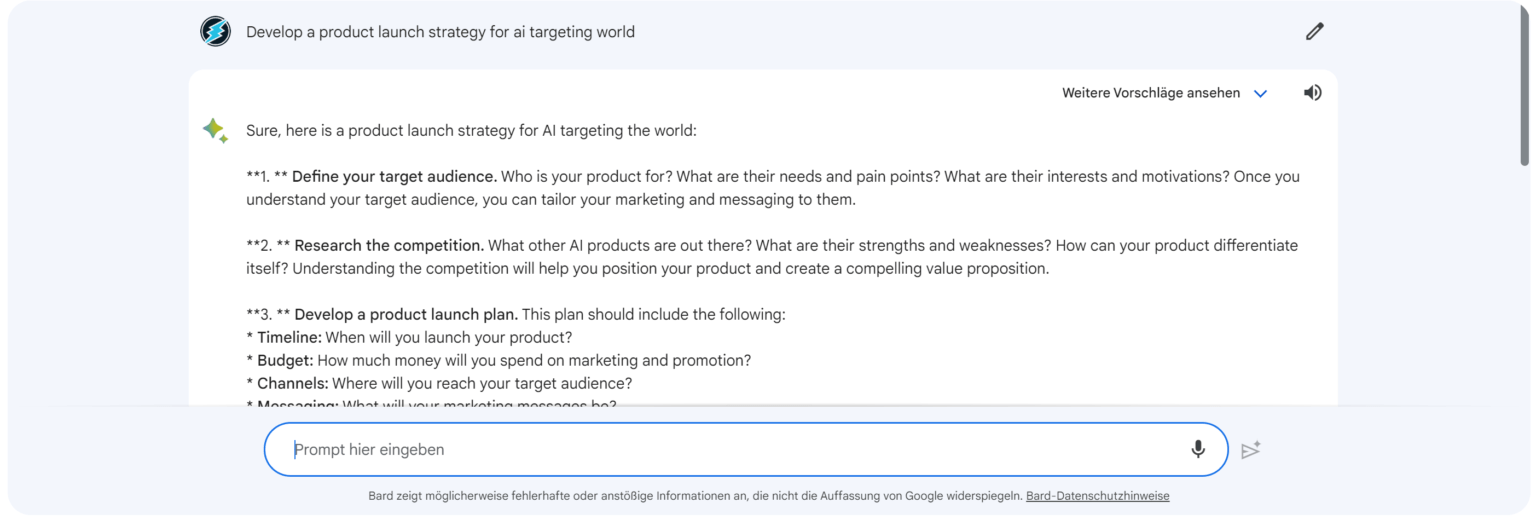
In the dynamic and rapidly evolving world of marketing, the task of formulating strategies and detailed plans can often seem monumental. This is where Artificial Intelligence (AI) comes in – it can function as your strategic partner, simplifying the process, and making it more efficient. Whether your role demands the meticulous planning of a product launch, the careful crafting of a content marketing plan, or the sophisticated task of optimizing SEO for your brand, AI prompts can be a vital tool in enhancing your efforts.
Harnessing AI for Tailored Product Launch Strategies
Think about the task of developing a strategy for a product launch. Suppose you have a unique product and a clearly defined target demographic. A well-thought-out AI prompt can be the game-changer you need. An AI prompt such as:
- “Develop a product launch strategy for [specific product] targeting [demographic]”
This prompt directs the AI to leverage its comprehensive database and analytics capabilities, providing you with a strategy that’s custom-tailored to your product and target demographic.
Crafting Strategic Content Marketing Plans with AI’s Assistance
Moving onto the realm of content creation, the importance of a strategic content marketing plan is immeasurable, especially in a saturated and competitive market. A niche-focused approach can be the decisive factor that tips the scales in your favor. Thus, a useful AI prompt like:
- “Create a content marketing plan for [industry] with a focus on [niche market]”
This instruction can guide your AI to generate a comprehensive plan that covers the broader aspects of your industry while homing in on the unique opportunities within your chosen niche.
Exploiting AI to Maximize Influencer Marketing Efforts
In the fast-growing field of influencer marketing, AI can play a substantial role. A well-devised influencer marketing campaign can greatly enhance brand visibility and drive key performance metrics. An effective AI prompt such as:
- “Outline an influencer marketing campaign for [brand] to increase [specific metric]”
This prompt can guide your AI to sift through the latest trends and crucial data points, setting your brand up for success in the influencer marketing realm.
Optimizing SEO Strategies with AI
Finally, consider the vital aspect of digital marketing – Search Engine Optimization (SEO). An effective SEO strategy can significantly amplify your business’s online visibility, particularly when targeted at a specific location. An astute AI prompt like:
- “Plan an SEO strategy for a type of business in the [location]”
Such a prompt will direct your AI to focus on high-impact keywords, prevailing trends, and SEO best practices, all of which are likely to yield significant results for your specific type of business in your chosen location.
In conclusion, no matter the marketing aspect you’re focusing on, AI prompts can considerably streamline your strategy development processes. The examples provided here serve as a demonstration of how these prompts can effectively harness the power of AI, providing you with a significant competitive edge in the ruthlessly competitive marketing landscape of today.
Business-Oriented Prompts
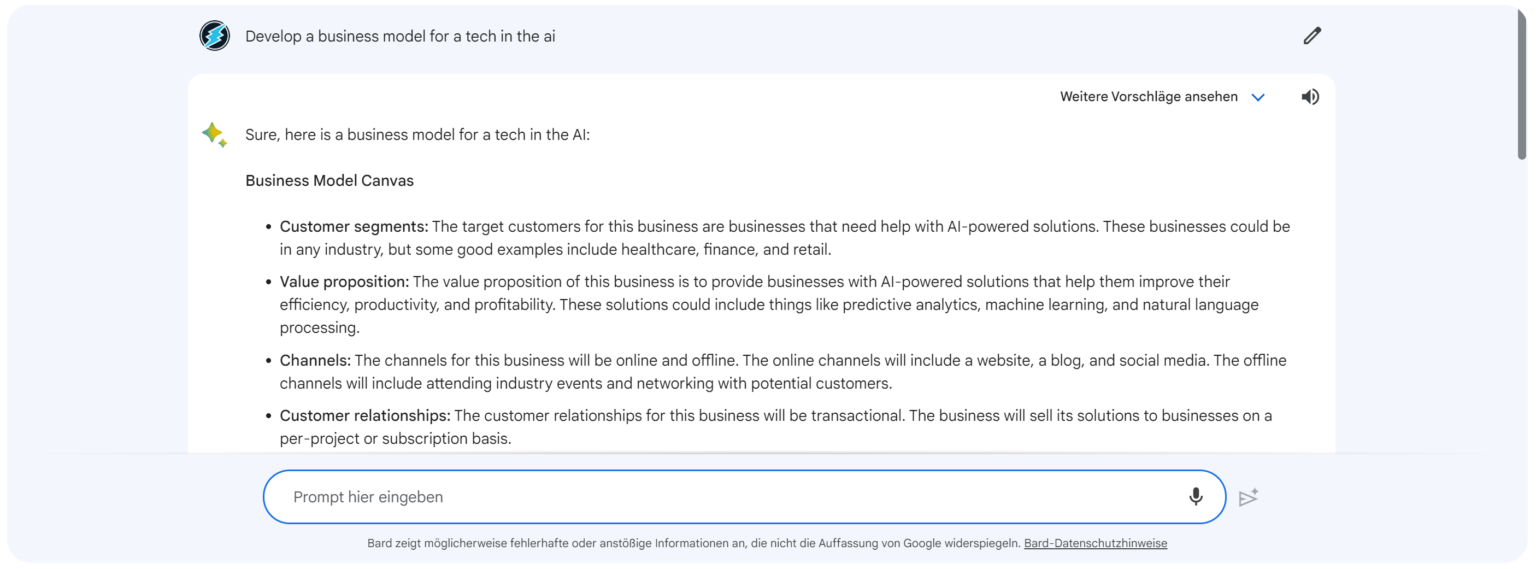
Artificial Intelligence (AI) has emerged as a game-changing tool for modern businesses. Its ability to analyze vast amounts of data, derive insights, and forecast trends has revolutionized business model development, SWOT analysis, financial forecasting, and the identification of growth opportunities. Let’s explore the specific areas where AI can provide a substantial advantage through tailored prompts.
Business Model Development
The success of a startup hinges on the strength of its business model. This vital strategic plan outlines a path to operational success and communicates the venture’s potential to investors. AI can be instrumental in developing a business model that takes into account industry trends, competitor strategies, and market conditions, yielding a plan tailored to a startup’s unique needs.
AI prompt:
- “Develop a business model for a [type of startup] in the [industry]”
SWOT Analysis
A comprehensive SWOT (Strengths, Weaknesses, Opportunities, Threats) analysis is a cornerstone of strategic planning. It allows a company to identify and plan for internal and external factors impacting its performance. With AI, this process can be streamlined and made more effective.
AI prompt:
- “Analyze the SWOT for [company] and suggest [strategic initiatives]”
Financial Forecasting
Predicting a company’s future financial performance is crucial for planning and sustainability. By analyzing past data and identifying trends, AI can provide accurate financial forecasts to aid in strategic planning.
AI prompt:
- “Create a financial forecast for [business] over the next 5 years”
Identifying Growth Opportunities
Spotting growth opportunities can propel a company to new levels of success. AI, with its ability to analyze market trends, competitive landscapes, and consumer preferences, can identify potential areas for expansion.
AI prompt:
- “Identify growth opportunities for [company] in the [industry]”
In conclusion, AI has the potential to significantly enhance strategic planning and decision-making in business. By using tailored AI prompts, companies can tap into this transformative technology and ensure they stay ahead of the curve in an ever-evolving business environment.
Prompts for Content Generation
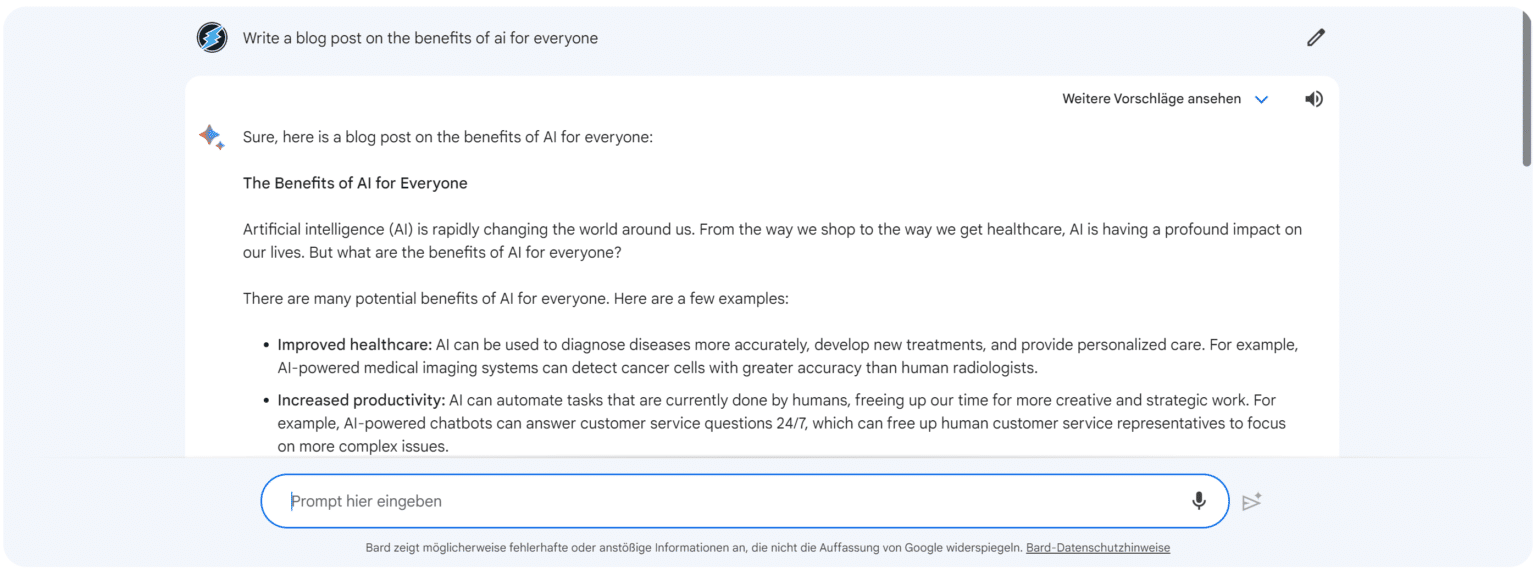
The art of content creation, whether it’s for writing a compelling blog post, developing an organized content calendar, or generating a media-catching press release, can be made significantly easier with the use of Artificial Intelligence (AI). AI can not only expedite these tasks but also infuse them with insights and details you may not have considered. Below, we present several examples of AI prompts that can prove to be beneficial in different scenarios:
Empowering Blog Post Creation with AI
When it comes to creating engaging and informative blog posts, understanding your target audience and the unique benefits of your product or service is key. A targeted AI prompt can play a crucial role in this:
- “Write a blog post on the benefits of [specific product/service] for [target audience]”
This prompt will guide your AI to craft a post that is not only thorough in its discussion of the product or service benefits, but also carefully tailored to resonate with the chosen target audience.
Planning Ahead with AI-Generated Content Calendars
An essential part of maintaining consistency in your content marketing efforts is having a well-organized content calendar. It can seem like a daunting task, but with the right AI prompt, it doesn’t have to be:
- “Develop a content calendar for a [type of business] in the [specific industry]”
This instruction will lead the AI to build a comprehensive and industry-specific content calendar, keeping in mind the unique needs of your type of business.
Crafting Press Releases Using AI
In situations where you need to announce company news through press releases, AI can assist in creating engaging and informative content that can capture the attention of media outlets. A relevant AI prompt for this might be:
- “Write a press release announcing [company news] for [media outlets]”
By using this prompt, you’ll enable the AI to generate a press release that effectively communicates your company news, while also ensuring it aligns with the style and expectations of the targeted media outlets.
In essence, the possibilities of AI assistance in content creation and strategic communications are vast. The right AI prompts can help streamline your tasks, ensure quality and consistency, and ultimately contribute to the success of your content marketing strategy.
Web Development Prompts
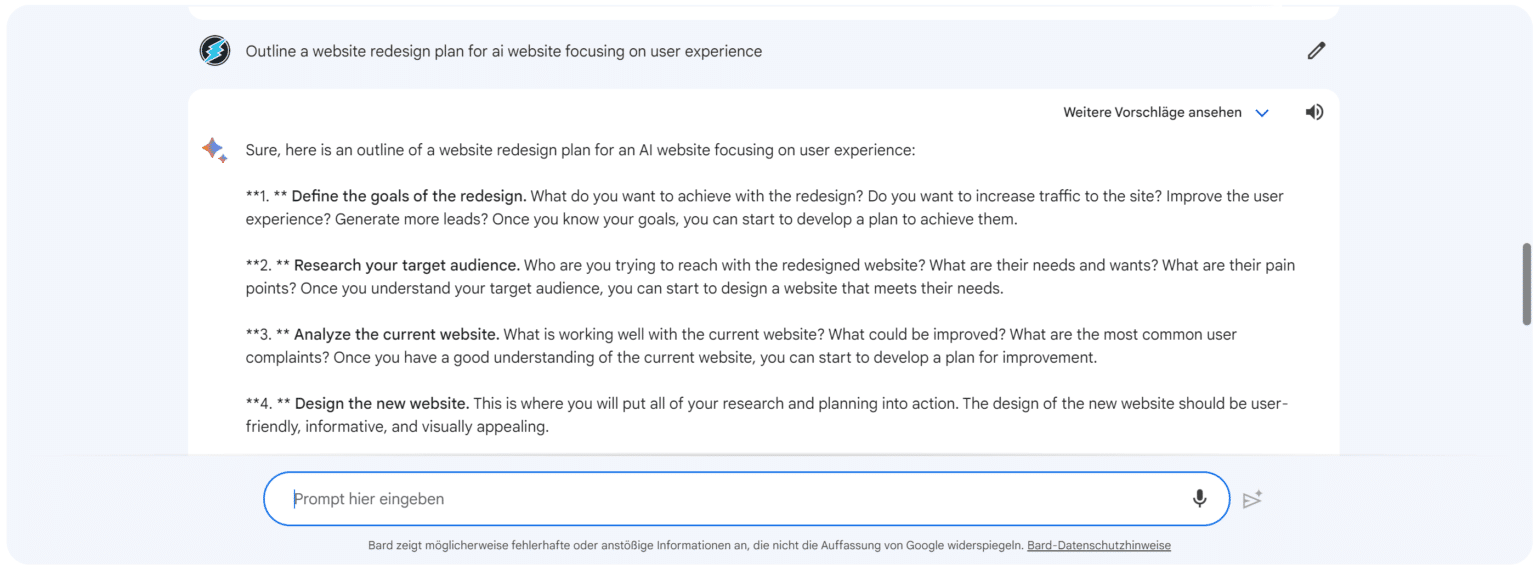
Artificial Intelligence (AI) can be a remarkable tool when harnessed in the realm of web design and performance optimization. Whether you’re considering a complete website redesign, planning a responsive design strategy for mobile experience, or aiming to enhance website performance based on specific metrics, AI can guide you through the process. Below are examples of how AI can be engaged through carefully tailored prompts:
Website Redesign Planning with AI
Embarking on a website redesign is a substantial task, requiring meticulous planning and an emphasis on enhancing user experience. AI can help streamline this process and ensure a user-centered approach. Here’s an appropriate AI prompt to consider:
- “Outline a website redesign plan for [business] focusing on [user experience]”
By using this prompt, AI can create a comprehensive redesign plan that not only addresses the specific needs of your business but also maintains a strong focus on improving user experience.
AI-Driven Responsive Design Strategy
With an increasing number of users accessing websites via mobile devices, having a responsive design strategy is imperative. AI can assist in developing such a strategy, ensuring an optimal mobile experience. Here is a practical AI prompt for this scenario:
- “Develop a responsive design strategy for [company website] to optimize [mobile experience]”
This prompt can guide the AI to design a plan that ensures your website is not only responsive but also offers an enhanced mobile experience, increasing user engagement and satisfaction.
Performance Improvements Based on AI Recommendations
Website performance is a critical factor influencing user engagement and SEO rankings. It often hinges on metrics like page speed. AI can suggest performance improvements based on these metrics with the help of a specific prompt such as:
- “Suggest performance improvements for [website] based on [page speed metrics]”
With this prompt, AI can analyze the specified metrics and offer a set of recommendations for performance enhancements, leading to improved user experience and potentially better search engine visibility.
In conclusion, AI’s role in web design and performance optimization cannot be overstated. With the right AI prompts, you can leverage its capabilities to plan website redesigns, strategize for responsive design, and make informed decisions about website performance improvements. This strategy not only optimizes your web presence but also offers an improved experience for your users.
Education-Focused Prompts
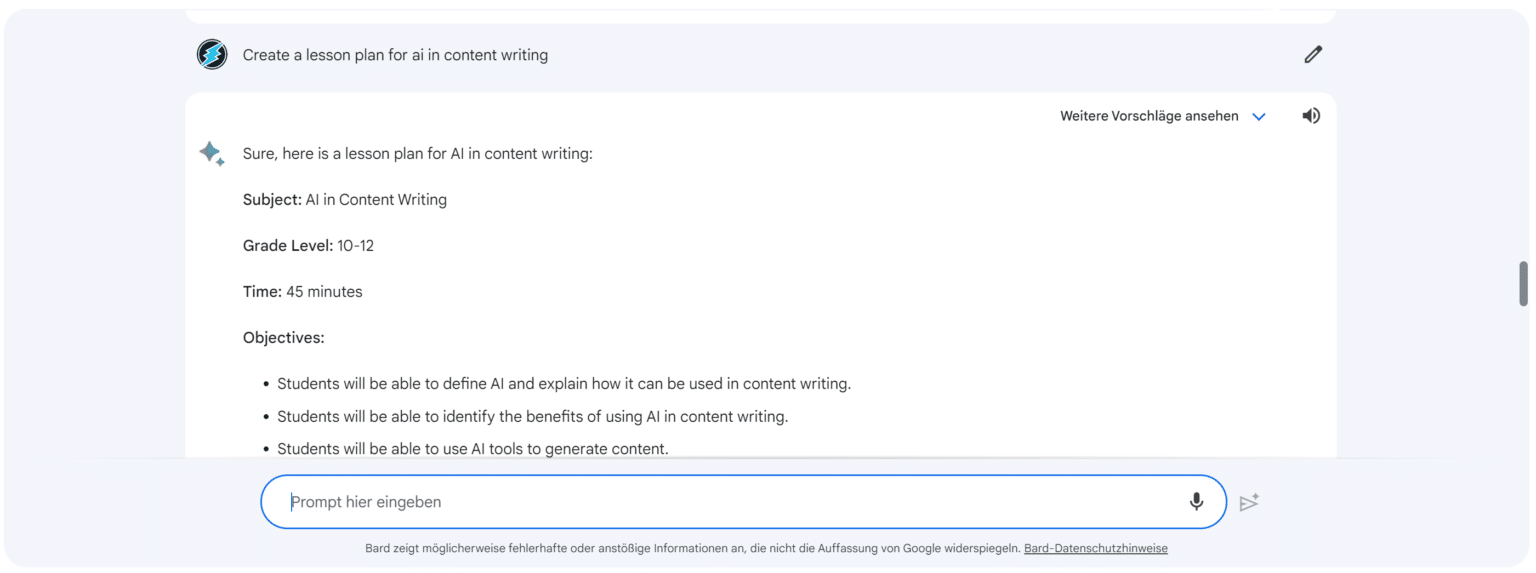
Artificial Intelligence (AI) can be an excellent tool in the sphere of education, providing educators with the necessary aid in crucial areas like lesson planning, student engagement, and professional development. As we navigate through the complexities of modern education, it becomes even more evident how AI can streamline these processes, making them more efficient and effective. Here are some instances where AI can be utilized, along with suitable prompts:
AI-Assisted Lesson Planning
Lesson planning is an essential component of effective teaching. AI can assist in the creation of structured and detailed lesson plans tailored to specific topics and subject areas. An example of a tailored prompt for this purpose could be:
- “Create a lesson plan for [specific topic] in [subject area]”
This prompt guides the AI to generate a comprehensive lesson plan, addressing the specified topic within the given subject area, potentially saving educators valuable time.
Creating Engaging Classroom Activities with AI
Engagement is a crucial factor in successful learning outcomes. AI can be instrumental in devising project-based learning activities that inspire creativity and critical thinking among students. A useful AI prompt for this purpose might be:
- “Outline a project-based learning activity for [grade level] students”
By using this prompt, AI can craft a creative and engaging project-based learning activity, suitable for the specified grade level, fostering an interactive and collaborative learning environment.
AI in Professional Development and Distance Learning
In a time where remote learning has become more prevalent due to factors like pandemics, AI can assist in formulating distance learning strategies. Simultaneously, it can be used to enhance professional development, enabling educators to better adapt to these new teaching environments. A prompt that could be used in this scenario is:
- “Develop a distance learning strategy for a [type of school] during [pandemic]”
Through this prompt, AI can outline an effective strategy for distance learning, taking into account the unique challenges presented by the pandemic and catering to the specific needs of the school type.
In conclusion, the application of AI in education offers promising avenues for lesson planning, engagement, and professional development. By utilizing AI prompts, educators can harness these benefits, driving innovation in teaching methods, and ultimately leading to more enriched learning experiences for students.
Music-Centric Prompts
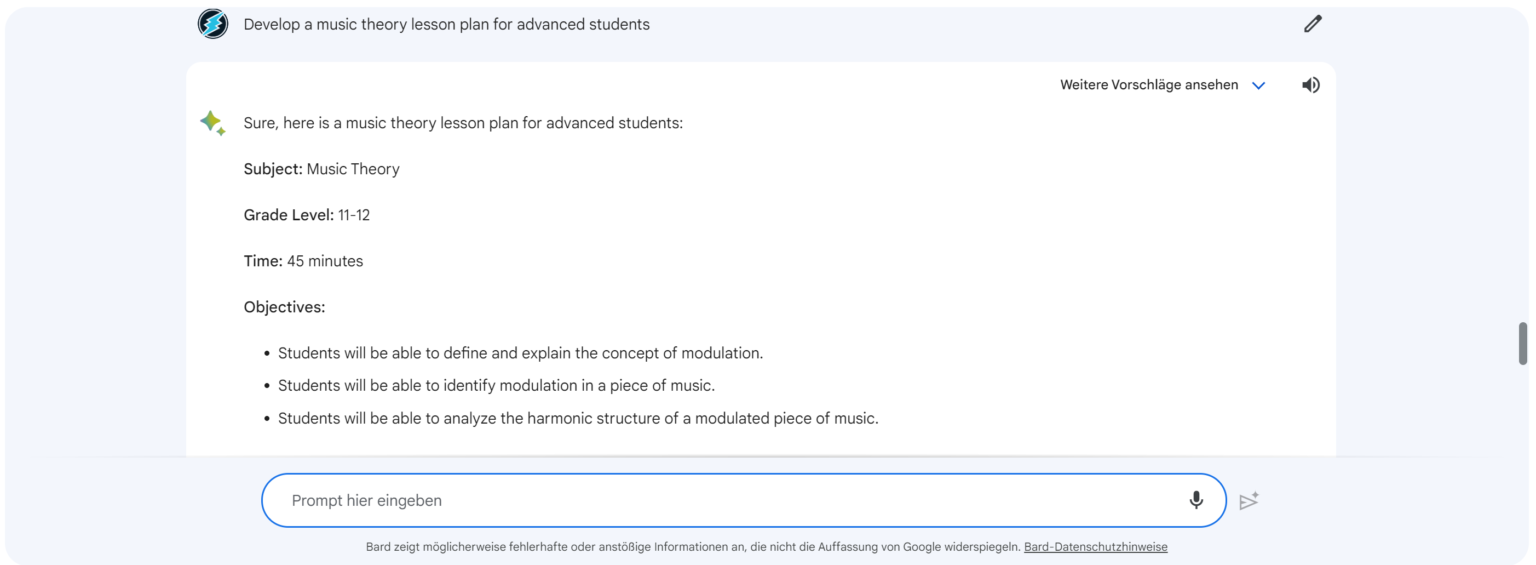
In the realm of music, Artificial Intelligence (AI) can play an innovative role, acting as an assistant for musicians in various aspects such as lesson planning, concert programming, and music production. Utilizing AI in these areas can provide a more structured approach, increase efficiency, and enhance the overall musical experience. Below, we delve into how AI can be harnessed in these scenarios with the help of specific prompts:
Harmonizing Music Education with AI
Music education, particularly in the realm of theory, can be significantly enhanced with AI’s aid. Whether for beginners, intermediates, or advanced students, a well-planned lesson can be instrumental in facilitating effective learning. For instance, the prompt:
- “Develop a music theory lesson plan for [beginner/intermediate/advanced] students”
could guide the AI in developing a comprehensive lesson plan that effectively targets the specified student level. This AI-assisted lesson planning could simplify the preparation process for instructors and enrich the learning journey for students.
Orchestrating Concert Programming with AI
When it comes to concert programming, striking the right balance of repertoire is crucial. It requires a thoughtful selection that resonates with the performing ensemble and the audience alike. With AI, creating a program becomes easier. Using a prompt like:
- “Create a concert program for a [type of ensemble] featuring [specific repertoire]”
can instruct the AI to generate a concert program that aligns with the characteristics of the ensemble and incorporates the specific repertoire, delivering a harmonious and impactful musical event.
Fine-tuning Music Production with AI
In the complex world of music production, AI can provide a well-defined workflow, particularly beneficial when working on specific genres. A well-organized production process can increase efficiency and enhance the final musical product’s quality. A fitting AI prompt in this context could be:
- “Outline a music production workflow for a [genre] project”
This prompt can guide the AI to create a streamlined workflow tailored to a specific genre, providing musicians with a clear roadmap to bring their musical projects to life.
In conclusion, the intersection of music and AI offers musicians unique possibilities, from educational aspects to production. By leveraging tailored AI prompts, musicians can streamline their processes and focus on the creativity and emotion that make music so powerful and universally loved.
Fun and Interactive Prompts
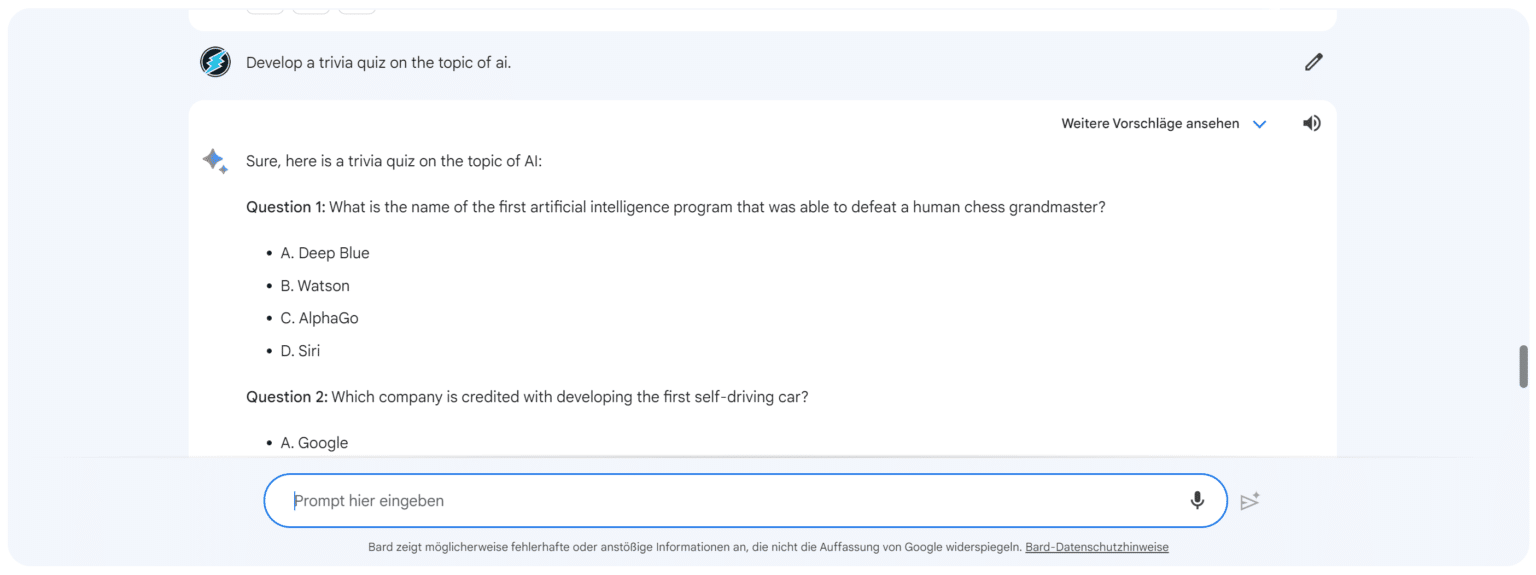
While Artificial Intelligence (AI) is known for its power and efficiency in a business context, it isn’t all about strict business. In fact, AI can also be your go-to for entertainment, making it a valuable ally for devising trivia quizzes, crafting word puzzles, or even outlining fun-filled party games.
Creating Engaging Trivia Quizzes with AI
For instance, if you’re in the mood for some mind-stimulating trivia on a specific subject, AI can be instrumental in developing a trivia quiz that keeps you and your friends engrossed for hours. The following prompt is a great way to get started:
- “Develop a trivia quiz on the topic of [specific subject].”
This prompt informs the AI about your desired subject matter for the quiz, leading it to craft engaging questions that challenge your knowledge of the chosen topic.
Crafting Intriguing Word Puzzles with AI
Word puzzles offer a fun way to test your vocabulary and problem-solving skills. AI, with its vast lexicon and computational prowess, can generate exciting word puzzles around a particular theme. You could use a prompt like this:
- “Create a word puzzle with a theme of [specific topic].”
By specifying the theme, this prompt helps the AI tailor the puzzle to align with your interests, ensuring an enjoyable and engaging experience.
Designing Team-centric Party Games with AI
When it comes to planning a party for a specific age group, team-based games can be a hit. AI can outline a variety of party games that emphasize collaboration and team spirit. Consider using a prompt like:
- “Outline a party game for [specific age group] with a focus on [teamwork].”
This command clearly communicates the target age group and the emphasis on teamwork, helping the AI create a game that not only entertains but also fosters camaraderie among players.
By strategically leveraging these prompts, you can unlock the full potential of AI tools like Google Bard and ChatGPT across a wide range of applications. Regardless of whether you’re a marketer, business analyst, content creator, web developer, educator, musician, or just someone looking for a fun and interactive experience, these AI chatbots offer something unique for everyone. So, dive in and start feeding these prompts to your chosen AI platform. As you witness the power of AI unfold before you, you’re sure to be left awestruck by the endless possibilities it presents.
What is Google Bard?
Google Bard is an innovative AI-powered assistant developed by Google. It harnesses the power of natural language processing to provide intelligent responses and assistance to user queries and prompts. For a more comprehensive understanding, visit our detailed page about Google Bard.
In which languages is Google Bard available?
Currently, Google Bard is available in Japanese, Korean, and US English. Google may expand the language offerings in the future to cater to a broader user base.
Can Google Bard be accessed with a personal Google Account?
Yes, users can access Google Bard with their personal Google Accounts. However, it is important to note that accounts managed by Family Link or Google Workspace for Education accounts designated under the age of 18 may not have access.
What are the system requirements to use Google Bard?
To engage with Google Bard and access its powerful features, you’ll need to meet the following system requirements:
- Supported Browsers: Google Bard is compatible with popular web browsers including Chrome, Safari, Firefox, Opera, and Edgium. Ensure that you have the latest version of any of these browsers installed on your device to enjoy a smooth and seamless user experience.
- Internet Connection: A stable internet connection is essential to interact with Google Bard effectively. Make sure you have a reliable internet connection to access and utilize the features of Bard without interruptions.
- Device Compatibility: Google Bard is designed to be accessible across different devices, including desktops, laptops, tablets, and smartphones. Whether you’re using a Windows PC, Mac, Android device, or iOS device, you should be able to engage with Google Bard as long as you have a supported browser installed.
- Operating System: As long as you have a compatible browser installed, Google Bard can be accessed from various operating systems, including Windows, macOS, Android, and iOS. Whether you’re using a Windows 10 PC, a MacBook running macOS, an Android smartphone, or an iPhone, you can leverage the power of Google Bard.
By meeting these system requirements, you can seamlessly interact with Google Bard, harness its capabilities, and explore a wide range of possibilities to assist you with your tasks and inquiries.
Does Google Bard utilize user location information?
Google Bard may utilize user location data, either in the form of general location or, with user permission, precise device location, to deliver more relevant and context-specific responses.
Are the responses generated by Google Bard the official views of Google?
No, it is crucial to understand that the responses provided by Google Bard do not represent the official views of Google. They are generated based on AI algorithms and should not be attributed as Google’s official stance.
Can Google Bard export responses to other Google products?
Yes, Google Bard enables users to export responses to various Google products. Responses can be exported to Google Docs, Gmail, or Google Sheets, depending on the content and its intended use.
In which countries is Google Bard available?
Google Bard is available in over 180 countries and territories, providing its services to users worldwide. It has a global presence, allowing users from various regions to access its features and capabilities. Some examples of countries where Google Bard is available include the United States, United Kingdom, Australia, Japan, South Korea, India, and Brazil.
For a complete and up-to-date list of countries and territories click here countries.
Is Google Bard continuously evolving and learning?
Certainly! Google Bard is an experimental technology that is constantly evolving. As it continues to learn from user interactions, it strives to improve its contextual understanding, accuracy of responses, and overall user experience.